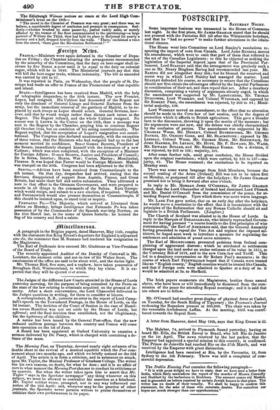POSTSCRIPT.
SATURDAY NIGHT.
Some important business was transacted in the House of Commons last night. In the first place, Sir JAMES GRAHAM stated that he should not proceed with the Factories Bill till after the Whitsuntide holydays, and that he " had no power" to make further alterations in the educa- tional clauses.
The House went into Committee on Lord Stanley's resolutions re- specting the import of corn from Canada. Lord Joex RUSSELL moved his amendment, which went to omit that part of them that referred to the act of the Canadian Legislature : to this he objected as making the legislation of the Imperial depend :upon that of the Provincial Par- liament. Lord STANLEY said that the arrangement was precisely such a one as Mr. Henry Bingham Baring had recommended last year. Mr.
BARING did not altogether deny this; he blamed the reserved and secret way in which Lord Stanley ad managed the matter. Lord STANLEY defended his course, as necessary to secure that the Canadians should not first obtain the advantages offered by the Imperial Parliament in consideration of their act, and then repeal that act. After a desultory discussion, comprising a variety of arguments already urged, in which the amendment was supported by Mr. LABOUCHERE, Mr. THOMAS DuxcoreaE, Lord WORSLEY, and Colonel WYNDHA.M, and opposed by Sir ROBERT PEEL, the amendment was rejected, by 203 to 94 ; Minis- terial majority, 109.
Lord WORSLEY moved an amendment, to the effect that no alteration should be made in the Corn-law of last session, and in the degree of protection which it affords to British agriculture. This gave a broader turn to the discussion, throwing it upon the merits of the measure ; but the arguments were not new, and the debate was chiefly characterized by the confusion of parties. The amendment was supported by Mr. CHARLES WOOD, Mr. HENLEY, Colonel RUSHBROOKE, Mr. GEORGE BANKES, Mr. ORMSBY GORE, and Mr. BLACKSTONE ; opposed by Mr. LINDSAY, Colonel WOOD, Mr. GEORGE HOPE, Mr. BORTHWICH, Sir JOHN HARMER, Dr. LEFROY, Mr. HUTT, Mr. P. HOWARD, Mr. WARD, Mr. EDWARD BULLER, and Mr. REDHEAD YORKE. On a division, it was rejected, by 203 to 102 ; majority, 101.
After some farther talk, amid great confusion, the House divided upon the original resolutions ; which were carried, by 218 to 137—ma- jority, 81. The House resumed ; the resolutions to be reported on Monday next.
There was some warm language from Irish Members, because the second reading of the Arms (Ireland) Bill was not to be taken first on Monday, or postponed till after the holydays : Sir JAMES Gaasafa promised not to bring it forward after nine o'clock.
In reply to Mr. MORGAN JOHN O'CONNELL, Sir JAMES GRAHAM stated, that the Lord Chancellor of Ireland had dismissed Lord Ffrench and Mr. Daniel O'Connell from the commission of the peace, for at- tending Repeal meetings. Upon which there was more warm language.
Mr. LANE Fox gave notice, that on an early day after the holydays, he would move a resolution to the effect that it is inconsistent with the principles of the Reformation that any Roman Catholic should sit and legislate in a British Parliament. (Laughter.) The Church of Scotland was alluded to in the House of Lords. In reply to the Marquis of BREADALBANE, who bitterly reproached Govern- ment for having pursued " a course hostile to the first principles of wise statesmanship," the Earl of ABERDEEN said, that the General Assembly having proceeded to repeal the Veto Act and replace the deposed mi- nisters, he hoped next week to introduce a measure for regulating the settlement and admission of quoad sacra ministers.
The Earl of MOUNTCASHEL presented petitions from Ireland com- plaining of aggravated distress ; which he attributed to settlements charged upon the land under an undue estimate of its value in 1815, to the Currency Bill of 1819, and to the new Corn-law and Tariff. This led to a desultory conversation on Sir Robert Peel's measures ; in the coarse of which Earl FITZWILLIAM hoped that if Canada were treated like an " English county," English counties would be treated like Canada, and that if foreign corn were admitted to Quebec at a duty of 3s. it would be admitted at 38. to Sheffield.


























 Previous page
Previous page